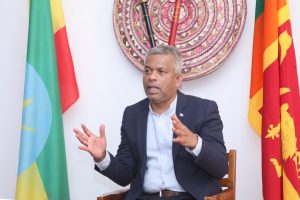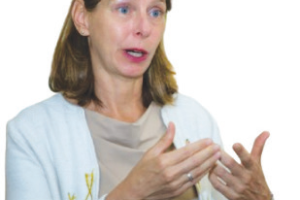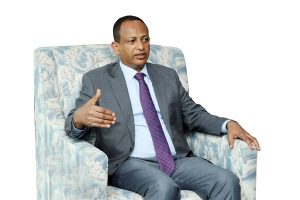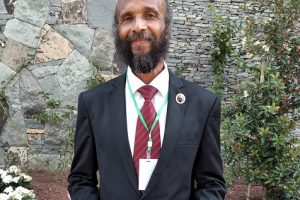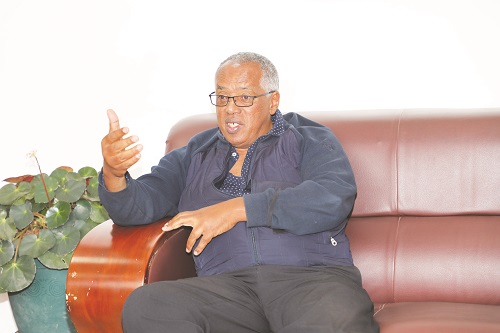
BY GIRMACHEW GASHAW
Today’s Guest, Ezera Abate (PhD), was born and raised in Addis Ababa, in a neighborhood called Piassa. He attended his elementary and secondary school education in Yared High School before it was raised to College of Music. In the meantime, he served as a member of Choir at the Holy Trinity Church. He believes that this is what motivated him to join St. Yared Music School and contribute some for the music industry.
While serving the church, he was highly impressed by gospel preachers invited by Archbishop Melketsedek. On his way in and out of the Church, he always gazed at the piano one day, he got close to it, he touched the buttons of the piano and heard the sound that it made. He soon became fond of it and dreamt to be a pianist.
He then tried to study piano as much as he could. However, no one helped him to master it until he joined the Yared Music School and graduated with great distinction.
He then served the music school as a lecturer for one year. Later he obtained a scholarship opportunity and traveled to Bulgaria. There, he studied music composition and received Master of Arts in Music.
After returning home, he has served the college for additional three years. In order to develop his career, Ezra went to Addis Ababa University again and received a Master of Art degree in curriculum and instruction as well as another Master’s degree in regional and local studies from the same university.
Ezra tried to bring diversity to the curriculum and music instruction with development, identity issues and people’s coexistence. He also strived to study the impact of conflict and governance over development taking the case of Gambela State, Ethiopia. Following the establishment of the Institute of Peace and Security Studies, he joined the institute and obtained his PhD.
As he has been working as a musician, Ezra tried to study how music or art in general could address conflict. Most of the time, the elites are politically concerned than ordinary citizens.
So, the point here is: How can we penetrate into society and transform conflict as it can be transformed either negatively or positively. He has been conducting research entitled ‘Music and Conflict transformation in the Ethiopian context’.
As a pianist, besides teaching piano at times when he was at Yared Music School, he was performing music by co-establishing a band. These days, apart from advising and examining graduate students, he lecturers on various fields such as music, curriculum, development studies and conflict & governance.
Now, Ezra is serving as a Dean of the College of Performing and Visual Arts. He also served as a board member of Ethiopian Peace and Reconciliation Commission. He spent a few hours with The Ethiopian Herald News Paper and raised a number of issues. Excerpts;
Would you please tell us the nexus between music and election?
Art is a communication medium. When one thinks about communication medium, he/she refers to exchanging of ideas and thoughts. Apart from that the society can take symbols as a communication tool. The communication medium varies from one another.
If we take sound for instance, it could be music or hearing something. The communication medium is easy to communicate with people. A two minute single album reaches easily for millions than a political discourse of a politician given for two hours.
A politician may make a political discourse collecting 100,000 people at a time. However, music can be reached to millions of people within a few minutes. Or, if you prepare a poster, it has a chance to be observed by many people.
However, the question that comes to everyone’s mind is, how can we exploit the art sector? If we use it wrongly, we may disturb people’s coexistence. If you use it positively, you can convey a good message for the people that give ears. What makes me bother is how can we internalize it?
If someone asks an artist about a picture and the artist cannot explain about it, the art is worthless. Thus, we have to create a mechanism that helps the society to understand the art. One thing to this end is the art should be supported by education.
The second important thing is the message the art needs to convey. Preparing music, theater, paint or any sort of art by itself is not an art by itself. That is why; we need to identify things that express the art well.
When I come back to your question, all human beings are interested in expressing their identity. In this case, being a winner or loser is not a big deal if we are accepting them as a blessing.
After you win someone, you should not walk off to hatred or marginalize your competitor. Unless you have to show readiness to work with your competitors, the winner does not get a space to put his idea. Being a loser or winner is not taken as the end of the world. Here, there should be tolerance.
In our context we could not separate the man from his idea even if there is a huge difference between them. In a dialogue, one can construct the other if the latter made a mistake and vice versa. If someone is ready to understand the other, the former may come up with better idea if he/she understands it well.
As elites are magnifying minor things, we want to reach the society at the grass root level. People easily understand any message if it is presented artistically. In this case, you made people rational thinkers instead of listening to rhetoric of elites which leads them to emotional activities.
If we say art is an instrument that brings the desired change, do you think the country has utilized the art sector extensively?
Let me address the question with question: Do we all understand what art means? What is it the art contributes to society? We have to evaluate how far we are going to utilize art. For what purpose we are utilizing the art sector. Unless we know the art well, how can we utilize the sector?
Except the popular art, we did not consider many things as an art. In our context, popular art has not put clear demarcation of boundaries between amateurs and professionals in every field of studies. It looks at every aspect, especially the politics. We are now in a position where we cannot identify the real politician. So, it is hard to say that we utilized the art sector very well.
However, we have to understand first how we can employ the art and what is going to do while utilizing the art. Let us take countries’ experience for the past 30 years, before that the military government highly utilized the art. In this context, popular artists are trying to bring something new from the previous narrative.
Let us take socialism; it is the government that brings the ideology first. Later on, we heard that socialism is expressed as culture of the people but it prohibited people from going to church. When the institution came out, the people returned to its previous position.
By the same token, an ethical entity was taken as one political narrative in the regime of EPRDF. So, EPRDF took one which is primordial thing. So it said your identity is defined by your blood. However ethnic identity can be constructed.
Here what our musicians are trying to do is, they played music in Amharic language but they use Tigrigna rhythm. The art enabled two ethnic groups who were in dispute to perform music show in a given stage. Here, you are creating new value.
Thus, the art or music can create new value and bring the two people residing distantly together. The same thing has happened in Kosovo. What they did is there is a bridge of soul; no one is permitted to cross it. If one does it, he/she would be assassinated.
However, the choir groups drawn from various people are allowed to cross the bridge and entertain the people turn by turn. By and large, they created new value or identity.
Beethoven, [a German Composer], also brings various people come from different backgrounds and put them together so as to produce something new and to talk one another while they are working jointly.
On the other way round, art enables people to bring new ideas. In any socio political issue such as election, you can bring people together. If you perform art in one place, people automatically forget everything and stand in unison.
Daniel Barenbolm, a pianist, also brings people contradicting one another and assisted them to play together. While they have been performing music, they exchange ideas and carry out various things.
How do you see Hizb le Hizb (People to People) in this regard? Do you think artists drawn from various ethnic backgrounds played important role to address socioeconomic and political problems observed in the country?
This is another issue. Hizb le Hizb organizers had tried to express historical narration. It has its own political impact which needs to be conveyed to society. If you take “Fiyorina”, a song by popular artist Tewodros Kassahun, expressed the love between Ethiopians and Eritrea using a metaphor.
Though he separated from his son due to border conflict, he forecast that they will meet again. Here, you can analyze the impact of the music even at times of war. The song has been heard in two countries equally.
If you take “Shemandefer” song, the artist convey message though there is religious difference between the man and the woman, nothing prohibited them to live in harmony as there is love between them.
The context can easily reach to the people. Four years ago, musicians were trying to produce music in Amharic language but in Oromo rhythm. I do not know if they are politically right or wrong but they can easily convey messages to the society.
In a song that takes five to seven minutes, they can reach millions of people. By the same token, politicians now echo their voices before the election is started. If the musician assists them to tone down their voice, they can convey plenty of messages to the society easily.
The politician took winning election as a big deal and made a mistake if they are trying to jump over the body of the looser. Being a winner or loser is not the end of the world. Hence, art is the easiest way to convey this message to the public.
For this to happen, a task force is needed. The government is good in making laws but does not live up to it. If the government or any political party wants to convey a tone down message, they have to use art.
What were the challenges artists were
facing to further flourish the art sector?
The artists were not well acquainted with the power and value of art. They do not know the difference between amateur and professional production. We perceive popular music as an art. We give more space for commercial art. However, many artists are carrying various tasks.
There are exhibitions, concerts which come up with artistic values and convey special messages to the society at large. In concert for example artists express collective talent. The artistic work can go as per the desire of an artist.
On the other hand, the government needs the art if something goes wrong, but this is equivalent to fire fighting. All of a sudden, the government forgets the art sector considering that things are back to normal and refrains itself from utilizing the wonderful opportunity within the art sector so as to resolve its basic problems on a permanent basis.
What needs to be underlined here is, unless it is supported by education, everything is a problem by itself. If you do not understand the material I presented to you, it is worthless for you. Similarly, the art work done to extinguish fire is not considered as an art.
Some people say art is a powerful instrument so as to bring notable change in socioeconomic and political respects. Do you agree with this statement?
Arab uprising is a typical example to answer this question. Though it was initiated by a self-emollition perpetrated by an individual, it was the art work that spread the Arab Spring to other countries. Art has a capacity of collapsing a given nation once and for all within a fraction of seconds. If you take the song “We are the world”, the organizers collected millions of dollars before it came out of the studio.
Thus, the art can easily convey a message and convert something to nothing and vice versa. It also implants positive perception in the minds of the people. The very setback here is people understand the power of an art after it damages more wealth. So we have to be aware on when and how we utilize it.
What has made us feeble from employing the art sector to come out of poverty?
We have used music or any sort of art to initiate people especially at times of war. In response, the people attracted by the lyrics, make themselves ready even to sacrifice for their country. Similarly, an art has the power of dragging people from a scarcity mentality.
We are always discussing the matter, but we have not been making strides to produce artistic works focusing on our poverty. However, the perception of today’s people is daydreaming something without doing something important or by sitting idle. We are always happy if we get something free of charge.
In short, we have a scarcity mentality. If we get some amount of money, we spend more than the expected and we don’t know how much is enough to us. Some people who approached EPRDF were collecting and stealing something important as much as they could. This is the result of a scarcity mentality.
So, unless we stand on our own feet, how can we win poverty? Now we are developing a habit of copying something original. In short we don’t want to create something authentic. Thus, we need to have radical change towards this end.
How do you evaluate the move to discourage plagiarism and promote authentic artistic works?
There are efforts but it is difficult to put how far we can go. If we think individually and give high respect and recognition for innovators, we can take that person as a model.
We have to provide value for innovators as it is the way many countries are moving to industrialization. Instead of receiving ideas, comments and suggestions from people as a blessing or as an important step to improve the innovation, innovators should not always seek praise from others.
You are appointed as a Board Member of Peace and Reconciliation Commission. This came at a time when the country is in trouble. What is your take on this?
As I told you before, my area of specialization is peace and security. Sometimes after you master a given field of study, we aspire to do something important. However, things will be different when you come to the reality.
Plenty of things have happened after I joined the Peace and Reconciliation Commission When you try to refer to proclamations, directives and so on, some tasks are beyond the capacity of the commission. What you think at individual level is not equivalent with the plan at institutional level.
The reconciliation commission has been doing various tasks since its establishment about two years ago. High profile people have been serving the commission as a member.
Bringing all members to the same idea by itself is a difficult task. I do not want to talk about the institution. However, I personally did not do the task I have been aspiring to. The reason may be because I am busy. However, the country has been doing various tasks related to reconciliation. There are two important things. There is Peace and reconciliation.
After you reconcile two parties, the government comes and charges one of them considering the crime committed one during a kind of conflict. If you take traditional conflict resolution mechanisms, the elders recall two conflicting individuals or groups and deal with the government. Once, the case is arbitrated traditionally, there should not be prosecution for the same offense. These are some of the challenges the commission has been facing so far.
If so, could the commission be able to achieve the target set?
The commission has tried to be politically correct. However, it proposes constitutional amendment and works with the attorney general. The commission has very dynamic members and tries to work with various organizations.
While you are trying to dry the source of conflicts, there comes another dispute among nations and nationalities of Ethiopia. We have to think about the proclamation first. I would like thank you for your willingness for interview
Please, don’t mention it.
The Ethiopian Herald February 23/2021

